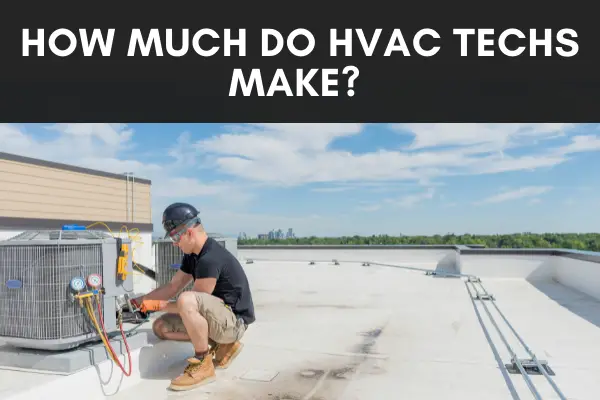Chances are, you’ve had a heating, ventilation, and air conditioning (HVAC) technician in your home within the last 5 years. These techs help keep us from swimming in sweat in the summer and freezing our fingers off in winter.
As per the U.S. Bureau of Labor Statistics, HVAC techs make an average of $50,590 per year or $24.32 per hour. This amount can be increased through overtime hours. While this is the average across the U.S., HVAC tech salaries depend on education, work experience, work specializations, and location.
This article will dive into the factors that affect HVAC tech salaries as well as how much these techs make by state.
HVAC Tech Salaries by State
As per Indeed, below are the average technician salaries by state as of 2021. These averages have been rounded to the nearest hundred and do not include overtime pay.
|
State |
Average HVAC Tech Annual Salary |
|
Alabama |
$39,000 |
|
Alaska |
$82,100 |
|
Arizona |
$47,500 |
|
Arkansas |
$37,900 |
|
California |
$73,500 |
|
Colorado |
$61,000 |
|
Connecticut |
$76,400 |
|
Delaware |
$47,500 |
|
Florida |
$41,300 |
|
Georgia |
$42,000 |
|
Hawaii |
$45,200 |
|
Idaho |
$42,500 |
|
Illinois |
$52,500 |
|
Indiana |
$44,300 |
|
Iowa |
$47,500 |
|
Kansas |
$39,800 |
|
Kentucky |
$45,200 |
|
Louisiana |
$56,400 |
|
Maine |
$46,400 |
|
Maryland |
$66,700 |
|
Massachusetts |
$81,700 |
|
Michigan |
$48,000 |
|
Minnesota |
$50,900 |
|
Mississippi |
$42,400 |
|
Missouri |
$41,800 |
|
Montana |
$51,400 |
|
Nebraska |
$45,800 |
|
Nevada |
$49,800 |
|
New Hampshire |
$52,800 |
|
New Jersey |
$70,600 |
|
New Mexico |
$46,200 |
|
New York |
$48,700 |
|
North Carolina |
$42,200 |
|
North Dakota |
$59,300 |
|
Ohio |
$46,600 |
|
Oklahoma |
$43,300 |
|
Oregon |
$45,100 |
|
Pennsylvania |
$46,200 |
|
Rhode Island |
$74,800 |
|
South Carolina |
$42,500 |
|
South Dakota |
$49,700 |
|
Tennessee |
$43,400 |
|
Texas |
$44,500 |
|
Utah |
$39,600 |
|
Vermont |
$45,100 |
|
Virginia |
$46,300 |
|
Washington |
$57,700 |
|
West Virginia |
$40,700 |
|
Wisconsin |
$48,000 |
|
Wyoming |
$54,500 |
Factors that Affect HVAC Tech Salaries
As with any job, not every HVAC tech will be paid the same. The factors that affect income include education, work experience, work specializations, and where the tech is working.
There are three main levels of an HVAC tech’s career: apprenticeship, journeyman HVAC work, and master HVAC work. Your salary will heavily depend on which level you want to reach.
HVAC Tech Education
After high school, most HVAC personnel will finish an accredited HVAC program. These programs can be 6 months to 2 years long and teach you the key systems and procedures for working within HVAC.
Other individuals may choose to skip the solely-coursework route and do a 3-to-5-year apprenticeship instead. Some may even take on an apprenticeship after their HVAC program.
An HVAC tech apprentice will work under other HVAC maintenance workers, learning to install, repair, analyze, and maintain HVAC systems in both residential and commercial buildings.
Apprentice HVAC techs will be paid for their hands-on experience, making an average of $31,000 per year. Apprentices just beginning their careers may make closer to $26,000.
HVAC Work Experience
After completing an apprenticeship, you’ll need to find out if your state offers licensing at the HVAC technician level. Some states may offer journeyman HVAC licenses, master HVAC licenses, or other specialty HVAC licenses, while others may allow you to work as an HVAC tech without a license under an HVAC contractor.
Almost all licenses will require you to take and pass an HVAC exam before approval. Journeyman HVAC techs should have anywhere from 2-4 years’ experience, for which you can include any apprenticeship work hours. For example, Iowa requires HVAC techs to complete a 4-year apprenticeship program to be eligible for the journeyman HVAC tech exam.
Master HVAC technician licenses require you to work for 2-4 years as a licensed journeyman HVAC tech before taking the master exam. For example, Maryland master HVAC techs need at least 3 years’ experience working as a licensed journeyman HVAC tech – that’s a minimum of 6 years from the start of apprenticeship until you’re eligible for the master HVAC license.
HVAC Specializations
While most HVAC programs cover all parts of the acronym, you can hone in on a specific part of the trade. As per Comparably and Salary.com:
- Air conditioning technicians have a median US salary of $45,110.
- HVAC installers have a median US salary of $58,847.
- Solar technicians have a median US salary of $58,429
- Refrigeration technicians have a median US salary of $46,783
These averages span across different states and experience levels, so it’s best to look up your specific state’s average before deciding if you want to pursue an HVAC specialization or not.
Work Location
As we’ve seen from the state comparisons above, where you work makes a big difference in your salary. Two HVAC technicians completing the same work in two separate states could see a $20,000+ difference in their paychecks.
While we may be tempted to say that the bigger paycheck is a better deal, be sure to consider the cost of living in that area. States with a cost-of-living index that is higher than the national average must pay more for the technician to maintain an average quality of life.
How to Become an HVAC Tech
If you’re new to HVAC, you’ll need to follow these steps to become a licensed HVAC technician.
- Finish high school or get your GED.
- Sign up for a state-approved/accredited HVAC training program (6 months – 2 years in duration) and/or a state-approved HVAC apprenticeship program (3-5 years in duration).
- Gain at least two years of experience working as an HVAC apprentice/trainee. Four years’ experience is preferred and required for most licenses.
- Apply for your HVAC journeyman license, if it is offered in your state. You will need to sit for and pass an HVAC journeyman exam.
- After approximately 3 years as a journeyman, you may be eligible for a master HVAC tech license.
- Complete any necessary applications, pay the licensing fee, and begin working as an independent HVAC tech*.
*Some states do not offer HVAC techs licenses but instead require you to be employed by an HVAC contractor. Always look at your state or municipality’s licensing page for the most up-to-date information on HVAC licensing.
The Bottom Line
The average salary for HVAC techs in the U.S. is $50,590 per year. The lowest-paying state (Alabama) only pays $39,000 on average while the highest-paying state (Alaska) pays $82,100.
As an HVAC tech, your salary will depend on where you work, your education, your experience, and whether or not you specialize in any part of HVAC.

